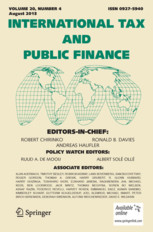Welfare effects of business taxation under default risk

08.01.2021
Welfare, Taxation, Risk
International Tax and Public Finance, 7 January 2021
In this article, we use a stochastic model with a representative firm to study business tax policy under default risk. We will show that, for a given tax rate, tax revenue and welfare are crucially affected by default risk and its costs, as long as interest expenses are deductible. Thus, an evaluation made without accounting for default may be dramatically biased. Moreover, we show that the “debt bias” due to the tax treatment of debt finance causes a quite relevant deadweight loss.
In this article, we use a stochastic model with a representative firm to study business tax policy under default risk. We will show that, for a given tax rate, tax revenue and welfare are crucially affected by default risk and its costs, as long as interest expenses are deductible. Thus, an evaluation made without accounting for default may be dramatically biased. Moreover, we show that the “debt bias” due to the tax treatment of debt finance causes a quite relevant deadweight loss.
